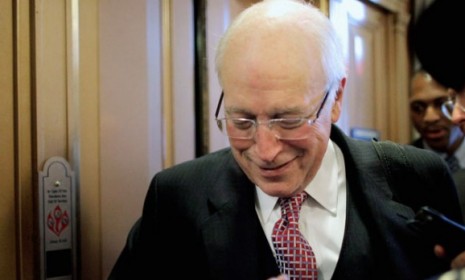Will Dick Cheney's heart transplant alter his personality?
A professional dancer started craving beer and KFC after receiving a young man's heart, suggesting that the former VP could be in for some big changes, too

As debate continues over whether former Vice President Dick Cheney, 71, received preferential treatment over other patients waiting for a heart transplant, some medical experts have a different question: Will the notoriously gruff Republican emerge from his transplant a nicer person? Past cases have demonstrated that heart transplants can cause personality changes. Will it happen to Cheney? Here's what you should know:
A heart transplant can affect your personality?
Yes. Some "patients who undergo the procedure, just because it is such an existential procedure, have a different appreciation of the small things in life, and a certain sensitivity they haven't had before," UCLA Medical Center's Mario Deng tells Discovery News. Deng tells the story of a cutthroat "type-A" litigation attorney who adopted more altruistic goals after his operation, vowing to spend more time with his family. Other doctors and psychologists claim an organ transplant can rewire a person in a more mysterious way, citing patients who awoke from heart replacements grappling with strange new feelings.
The Week
Escape your echo chamber. Get the facts behind the news, plus analysis from multiple perspectives.

Sign up for The Week's Free Newsletters
From our morning news briefing to a weekly Good News Newsletter, get the best of The Week delivered directly to your inbox.
From our morning news briefing to a weekly Good News Newsletter, get the best of The Week delivered directly to your inbox.
What are some of the examples?
Gary Schwartz, a psychology professor at the University of Arizona, says he has seen more than 70 transplant patients who displayed eerie similarities to the heart's previous owner. Claire Sylvia was a professional dancer who received the heart of an 18-year-old man. After the surgery, she reported craving beer and KFC, just as the donor had. And a 7-year-old girl experienced terrifying nightmares about being killed after receiving the heart of a girl who had been murdered.
Why does this happen?
Schwartz has a theory called "cellular memory," according to which all the major organs develop a degree of memory. "When the organ is placed in the recipient, the information and energy stored in the organ is passed on to the recipient," he says. "I don’t want to frighten people, but I believe transplant patients should be told there is a possibility that they will take on a donor's characteristics."
A free daily email with the biggest news stories of the day – and the best features from TheWeek.com
Is that really the explanation?
Plenty of cardiologists dismiss the idea. Among the more straightforward explanations: "A new lease on life tends to make people happier and more optimistic," says Will Oremus at Slate, "sometimes to the point of temporary euphoria." Any other changes, like adopting a taste for fried chicken, could simply "be a coincidence," or due to an onslaught of new medications.
Could this happen to Cheney?
There's no way to know for sure, says Schwartz. "But is it scientifically possible? Absolutely."
Sources: The Daily Beast, Discovery News, Red Orbit, Slate
-
 Grok in the crosshairs as EU launches deepfake porn probe
Grok in the crosshairs as EU launches deepfake porn probeIN THE SPOTLIGHT The European Union has officially begun investigating Elon Musk’s proprietary AI, as regulators zero in on Grok’s porn problem and its impact continent-wide
-
 ‘But being a “hot” country does not make you a good country’
‘But being a “hot” country does not make you a good country’Instant Opinion Opinion, comment and editorials of the day
-
 Why have homicide rates reportedly plummeted in the last year?
Why have homicide rates reportedly plummeted in the last year?Today’s Big Question There could be more to the story than politics